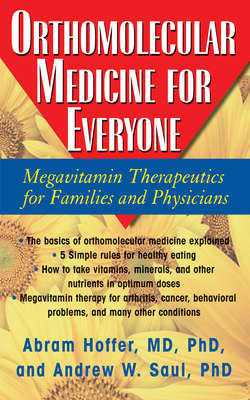Читать книгу Orthomolecular Medicine for Everyone - Abram Hoffer M.D. Ph.D. - Страница 13
На сайте Литреса книга снята с продажи.
ORTHOMOLECULAR PSYCHIATRY
ОглавлениеOrthomolecular psychiatry has the same relationship to orthomolecular medicine as does orthodox psychiatry to orthodox medicine. Every patient with any disease has a psychological reaction or component that may be very minor and not require any psychiatric treatment, or it may be of such severity as to necessitate psychiatric treatment. For many patients, both specialties must work together.
Orthodox medicine tends to think in organic or psychological terms. If a thorough physical examination and tests do not reveal a sufficient explanation of the symptoms, then that patient’s illness is promptly dumped into the psychiatric area. Even the use of psychosomatic medicine has not altered this, for to most physicians psychosomatic medicine is looked upon as a disease with physical symptoms caused by psychological factors. In short, these physicians lump both psychiatry and psychosomatic medicine together.
Orthomolecular physicians recognize that a large fraction of the psychiatric patients are ill due to physical factors, not due to any organ dysfunction. The usual tests do not reveal pathology. These physical factors are changes in metabolism and/or nutrition. They might be looked upon as humoral factors or as a third category of illness. When treated successfully, the psychiatric symptoms clear. Very little psychotherapy is required, and that can be given by any competent physician.
In my practice, I have estimated that if each referring physician were to first place his or her patient on an orthomolecular regimen and wait up to three months, I would lose half my practice. Patients who require orthomolecular psychiatrists suffer from prolonged anxiety or depression, or from schizophrenia, or from other disorders that the general practitioner is not equipped to deal with due to lack of time, experience, or skill. A few orthomolecular physicians have been very successful in treating large numbers of schizophrenics, most of them failures of orthodox psychiatry (drug treatment alone).6
The same basic principles apply to orthomolecular psychiatry—the principle of individuality, the orchestra principle, and, very importantly, the recognition of the syndromes that comprise psychiatric diagnosis. None of the psychiatric diseases are homogeneous but rather are caused by a variety of factors. For example, psychiatrists have divided schizophrenia into a number of subgroups, such as catatonic, paranoid, etc. This differentiation is based on clinical descriptions but is of little value since they do not endure, nor do they help indicate which treatment should be used. The syndromes that orthomolecular psychiatrists use are based on causal factors and do help determine treatment.
A source of conflict between orthomolecular and other physicians is their expectation of the quality of recovery. Expectations of recovery depend on one’s experience of the quality of recovery. Psychiatrists who use tranquilizers only expect that they will reduce the intensity of symptoms in nearly every patient, provided they have selected the most efficient dose. But they expect few recoveries, and over the years they have learned the cost to patients for the relief they have gained—the inability to function normally in the community and neurological side effects. Tranquilizers work rather quickly and rapidly control symptoms, but they do not bring about recovery in many patients.
Orthomolecular psychiatrists combine the rapid effect of tranquilizers in reducing symptoms with the slower effect of a nutrient treatment in reaching recovery. They see a much larger proportion of schizophrenic patients get well to a degree not seen by tranquilizer therapists. The latter group believes that orthomolecular therapists are prone to exaggeration. Tranquilizer physicians with the usual prejudices against nutrients who have seen the results of treatment on their patients are usually astonished at the quality of recovery. When a patient has recovered, one does not need a questionnaire or scale to determine this. In sharp contrast, tranquilized patients may appear to be better, even though there has been no improvement in their psychosis.
